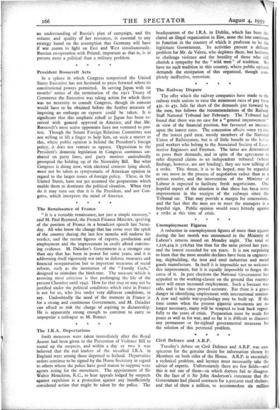The Railway Dispute The offer which the railway companies have
made to the railway trade unions to raise the minimum rates of pay from 43s. to 45s. falls far short of the demands put forward by the men, but follows the recommendations of the Railway Staff National Tribunal last February. The Tribunal had found that there was no case for a " general improvement " in view of the financial position, but favoured an increase upon the lowest rates. The concession affects some 15 oo) of the lowest paid men, mostly members of the National Union of Railwaymen, but is of little benefit to the b,t-er paid workers who belong to the Associated Society of Loco- motive Engineers and Firemen. The latter are determined to press their demands, and in spite of the agreement to refer disputed claims to an independent tribunal (whose findings, however, are not binding), they are now talking of a strike. This threat, it is to be hoped, may be regarded as one move in the process of negotiation rather than as a serious resolve, and the intervention of the Minister of Labour is expected to facilitate fresh negotiations. One hopeful aspect of the situation is that there has been some improvement in the receipts of the railways since the Tribunal sat. That may provide a margin for concessions. and the fact that the men are to meet the managers is a hopeful sign. Public opinion would react bitterly against a strike at this time of crisis.








































 Previous page
Previous page